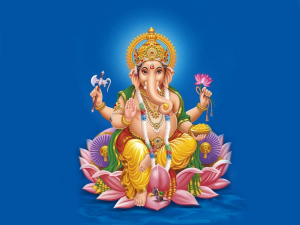Context:
The informant – RB – is a middle-aged Hindu woman, originally from West Bengal, India. She now works as a nutritionist in South Florida, and is one of my mother’s closest friends. The following happened during a conversation in which I asked her to tell me about some of her favorite Indian folklore, particularly about holidays and celebrations.
Piece:
Diwali is called the Festival of Lights. This is kind of associated with on of our mythologies, which is Ramayana, where Rama, who is a prince, was sent to exile for fourteen years. Rama’s father was a king, married three times. By rule, what happens is the eldest son is successor to the throne. But, what happened was, the middle wife goes to the king, who in the past helped him a couple of times, and the king had said, “I want to grant you two wishes, since you took such good care of me.”
And she said, “I don’t need anything now, but when the time comes, I’ll ask you for my wishes.”
So when her children grew up, she went to the king and said, “Now you have to grant me my two wishes.”
So the king goes, “Okay, tell me what you want me to do.”
She says, “I want you to send your oldest son to exile for fourteen years, and I want you to make my son the king.”
The king was very upset, he’s like, “That is unheard of – you cannot do that.”
But she says, “You said you would grant me two wishes, those are the only two wishes I have.”
And the oldest son, who was very respectful of his father, says, “You know what? If that’s what you had promised her, I don’t mind. I’ll go into exile for fourteen years, and I’ll come back after that.”
So he goes into exile, and there are a whole bunch of stories about what happens when he’s away. But, the day that he comes back to his kingdom after being in exile, the whole country was lit up with diyas to welcome him back, since he was such a good person. And that’s the day we also – since it was believed that, when he comes back to the kingdom, there will be wealth and prosperity – worship the goddess of wealth, since it is believed that, on Diwali, that is the day that wealth and prosperity will come to your house.
So you will see all Hindu households light candles, exchange sweets, exchange gifts and clothes: it is a huge time of celebration. There is one thing we also do, and it is kind of related to your Halloween. We also light a lot of fireworks that day, because we say we are scaring away the evil with the fireworks; and we are welcoming the good by welcoming the candles and the diyas.
(Later, after asking about the religious nature of the holidays)
RB: We call it religious, but they are more social religious than just religious, because it all involves inviting people, having dinners, lunches, dressing up, having music and dances. There’s a lot of culture that is associated with these festivals, so it is not that you’re just in the temple, reciting hymns or chanting. That is a very small part. It’s all about dressing up, looking good, and eating food. That is how we keep in touch with each other. At these festivals, at these religious ceremonies as we call it, we go visit each other. We keep in touch with each other and socialize with each other. I think we use it more for socializing and less for religion, which is how it should be.
One thing I want to clarify is that Hinduism is not a religion. It is mostly a way of life. And that is why you can’t be converted to Hinduism: because, either you are born one or you’re not. And if you are born one, you are taught the way of life since you’re born. But, you can still marry into it. We do not require people to change their religion when you marry, because we just think that when you come to a Hindu household, you will learn the way of life. Hinduism does not require that you go to a temple everyday, or pray everyday. They just teach us that everything should be a part of your life: that you clean your house and take care of each other, etc.
Analysis:
It was very interesting to hear how RB views Hinduism – not as much of as a religion, but more as a culture and lifestyle. Hearing the mythologies of these holidays with this context explains why there is seemingly more variation in the ways people tell these stories. It seems as though Hindus really value large social gatherings, and will use religious holidays as excuses to throw large social celebrations. It seems that the point of many religious occasions is much more social than it is religious. I feel that this is likely the result of a seemingly much more inclusive and accepting religion, that values socializing and lifestyle over religious and social boundaries.


